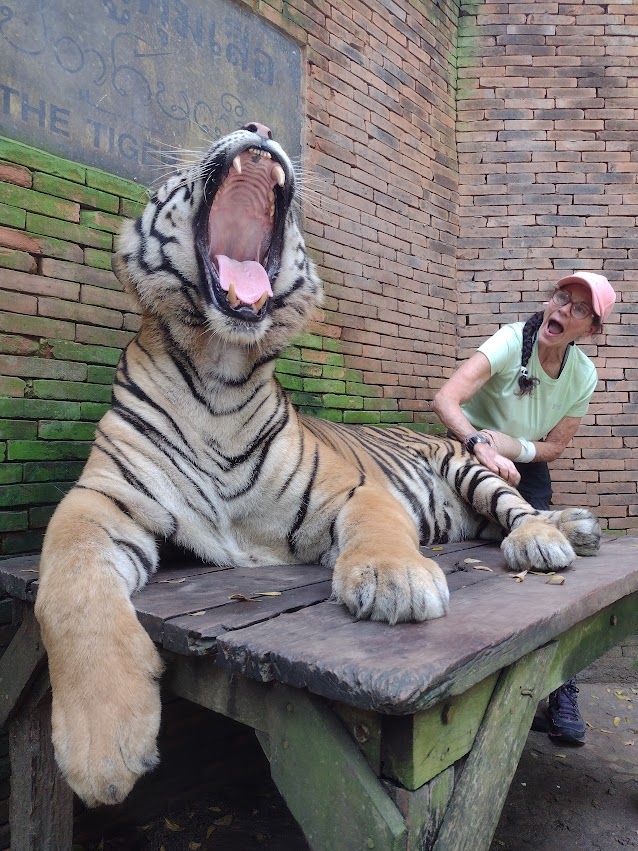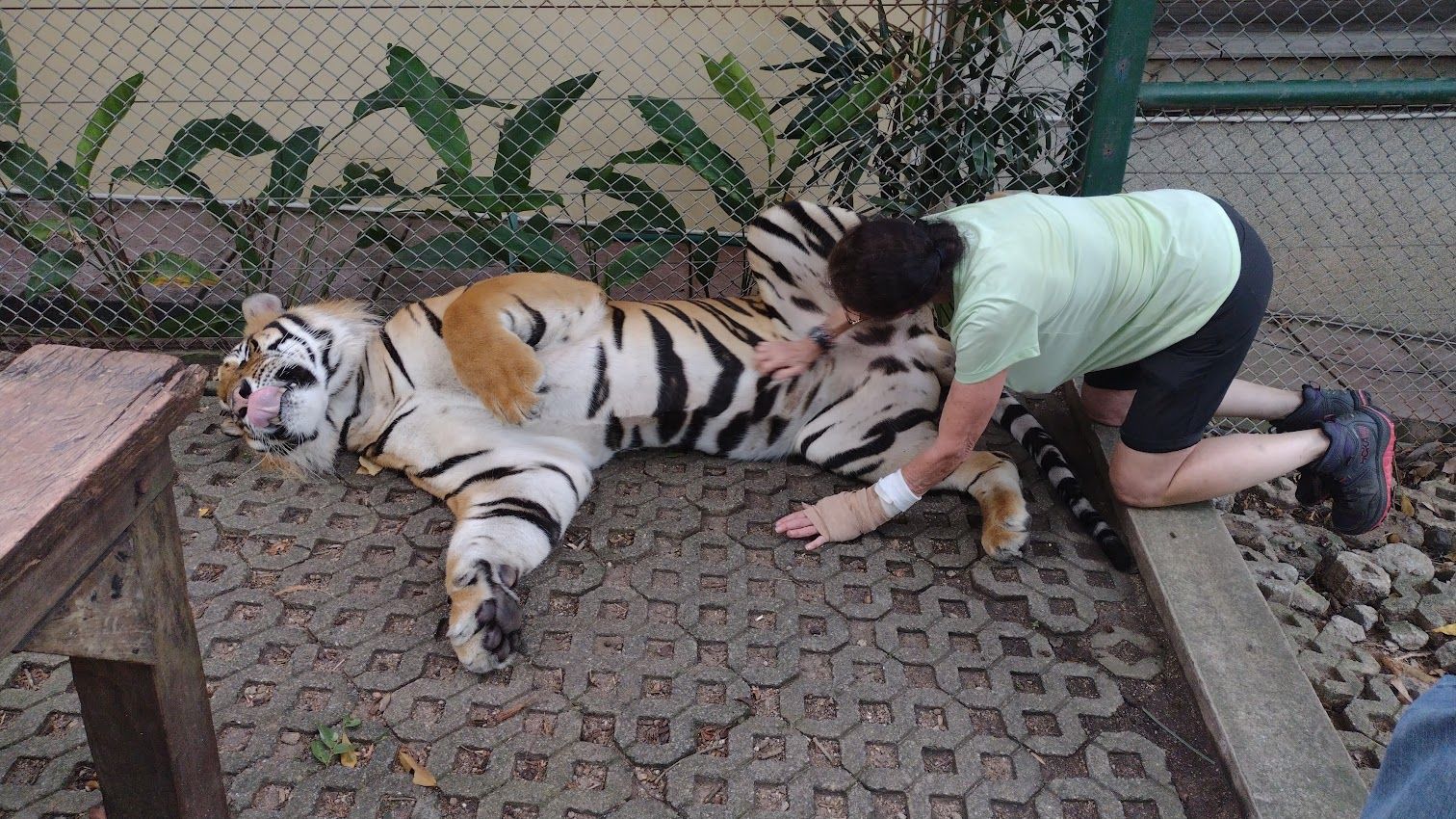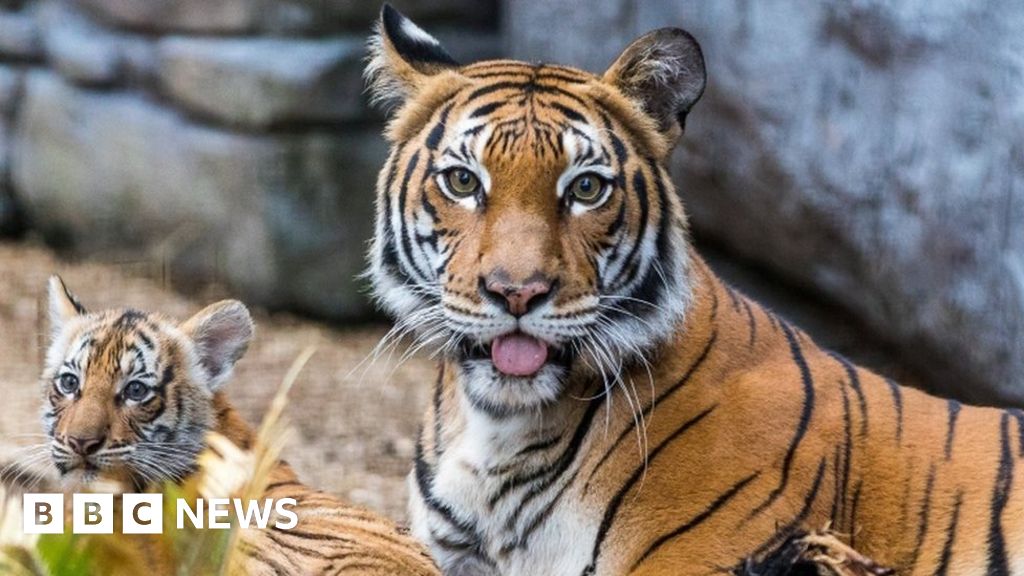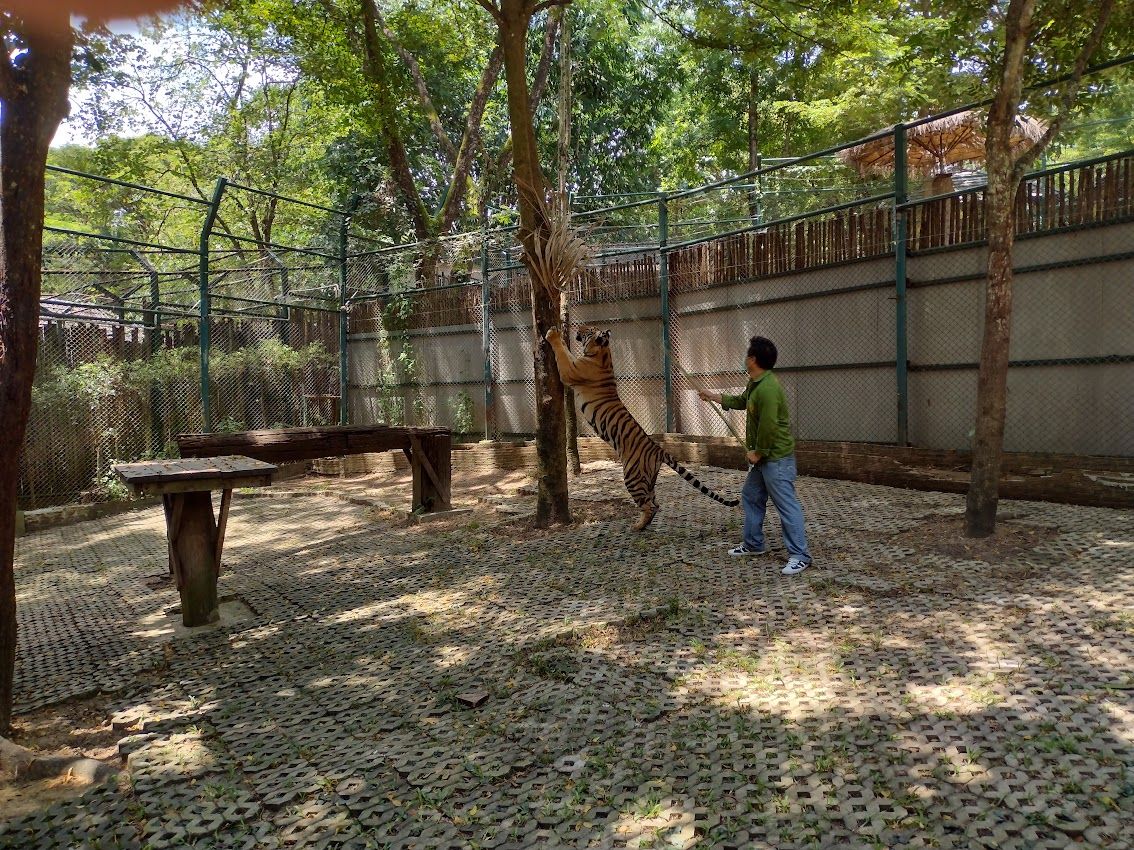
This isn't for everyone. It is for me.
Dear Reader: While in Thailand, I am visiting two of the three Tiger Kingdoms. Not my first time to them, and I am well aware of the strong feelings which can rise concerning such places. I will be doing several articles, of which this one intends to set the stage for the others. If these facilities trouble you, don't read. If you feel the need to attack me without doing your own research and indeed, visiting these places, you will be summarily blocked. I respect that these are tough subjects, but there are no easy answers. Thanks for reading.
There is a fair bit of controversy around places like Tiger Kingdom. To be fair, situated as it is close to China and other parts of Asia where trade in tiger parts is very lucrative, lots of people make the argument, often unsubstantiated, that they are in the business of animal parts.
That any and all such facilities are, by their very nature, involved in illegal trafficking. I beg to differ.
Until and unless those same people have done an investigation which has been validated by all the proper authorities, then they are armchair quarterbacks. Most have never been here, and all too many who do come don't bother to talk to anyone. Such organizations interest me for multiple reasons, but so do safaris.
Let's talk for a second here, just to set the stage.
Purists love to make the argument that the only place for wild animals is in the wild. I wholeheartedly agree. Until you run into two intractable issues: there is very little wild left, and what's left is going fast to developers, miners and anyone else with money. The second is that particularly when you're talking about animals whose parts are valued for their (unsubstantiated) ability to make itty bitty manly man parts more effective, said animals don't have a chance in hell.
These stats are dated but they give you an idea. Assume the bounty has gone up the harder the parts are to get these days:

For a dirt-poor poacher, they have nothing to lose and a lot of money and prestige to gain if they can bag a tiger for thousands of dollars.
Unfortunately, the animals, and those of us who love them, have everything to lose.
This doesn't begin to address the trade in exotic pets, poaching for ivory or all the other evil ills we humans visit on our furry, fishy and feathered friends who can't seem to get a break from our greed.
The very medium- social media- by which people want to attack and shame those who visit these animals where we can is precisely that medium by which poaching became a lot easier. So you will kindly stuff it before you air your complaints using the very medium which made animal poaching and trafficking vastly worse.
Just saying.

Here's the deal.
Tiger Kingdom continues to pass tight muster and monthly visits from a Thai government already stinging from the very public closure of a similar site in Sri Racha where cross-breeding and sales of tiger parts were indeed going on. The Thai people aren't fond of that kind of controversy, and the loss of many of the tigers angered wildlife enthusiasts the world over. There is an active movement to control or shut down those facilities which clearly involve cruelty or neglect. Those issues are not present at Tiger Kingdom, not that I have seen, albeit kindly, I am not privy to the entire operation. No outsider can be, to be fair.
I saw big, wide, open areas, water features big enough for three or four cats to gambol in but which were dedicated to one or two tigers, grass and shady trees along with plenty of fans. There is plenty of fresh cool water and good food. The animals are shiny, healthy, neither obese nor skin and bones. And there aren't that many of them. There was no overcrowding.
You could make a solid argument, and I do, that the three Tiger Kingdoms (the third is for large, retired tigers which need more open space and different care than younger ones) are a far better tradeoff than throwing these creatures into the last of the wilds to try to survive when sophisticated poaching techniques in a much smaller wilderness area virtually guarantee their demise.
We are caught between a rock and a hard place with such animals. All tigers are endangered; some already extinct. This is made worse when idiots cross breed them, which is fodder for a separate discussion. Greed knows no bounds.
If you want to be furious, be furious about the nitwits who buy tigers for their own amusement and keep them in their homes. This is far more widespread than you might imagine.

That doesn't begin to address the issue worldwide. So before you start barking at people who run a facility like this you might want to do some research on how widespread the practice of keeping exotic (read large and dangerous) animals is right in our own backyard. Just saying.

Bans won't stop rich people from being stupid. If they did, there would be a lot fewer rich people.
I fully understand the absolutist argument to either leave tigers alone or put those in captivity back in nature, but those arguments do not address the realities. That is precisely why there are conservation efforts in place to protect the big mammals like elephants and rhinos. Those can only be successful with expensive anti-poaching methods and deep ties to the communities which surround those compounds, such as with Ol Pejeta, in Kenya. Those take years and years to build and create, and massive amounts of money, investment and donations to maintain.
My favorite author, Dr. Carl Safina, wrote a book on animal communication, Beyond Words, spending part of his time studying elephants in Kenya. Imagine how he felt when he found out that at least one animal he had studied had been shot for its ivory. My sad guess is that by now many more have been shot. You see my point.
Or maybe you don't. It is nearly impossible to truly protect what we have left.
So while I most certainly understand and empathize with the argument that tigers (and all other wild beasts, fish and feathered beings) belong in the wild, until the governments of those countries where tigers once roamed are willing to do something serious about habitat loss (they aren't) or poaching (ditto), tigers and too many other great mammals face imminent extinction within just a few short decades.
I'd like many things to be different. But we are where we are, and so I went where I went because I love working on big animals. I'm a trained masseuse who no longer wants to work on people. What I do relaxes them, makes them sleepy and happy and gives them a lot of pleasure. I don't just look and gawk and get my photo taken so that I look brave. I work until I have sweat dripping into my glasses and my hands ache. I risk getting my body sliced open by rubbing and massaging these animals in ways they have never been touched.
The animals love what I can do for them. For most it's a revelation; it's highly unlikely that any handler has ever given them a proper massage, including between the toes where those great claws are sheathed. Sometimes after working on these creatures they will try to follow me out. I'm not lunch. They received another order of care and love, and by god they want more of it.
The handlers watching this get the message. They too can give their charges more love and earn the tiger's love in return. Or an elephant or a horse or whomever I happen to be working on.
The real truth is that these creatures never needed us and they sure as hell don't need my massage. But we've limited their options to the point of near-extinction. So since I can do something kind for them, I do. If I had a choice, no tiger would be in captivity for any reason ever and we would only see them at a safe distance with the kind of awe they deserve.
I work with creatures who can remove my punkin head with one swipe of a paw. There is no reaction time. So I'm taking a huge chance here. I ask them to trust my hands, and they do. They roll over and give me belly, stretch like a lazy kitty and grunt with pleasure. They aren't drugged. Big cats like these sleep up to 18 hours a day.
Massaging them just makes their sleep even more gorgeous.
I spent a total of four hours with the animals, the staff and wandering the facility. I watched keepers play with a big female like you would with a kitten, getting the animal to climb trees, leap into water and play tug of war with a long pole festooned with pieces of palm tree.

Should you go? I hope you do. Covid was rough on these outfits, dependent upon tourist income as they are. You could argue that by making them popular, others will spring up. That already happened, as with the elephant sanctuaries. If it makes money, in a poor country, everyone wants to open up a tourist attraction, just like everyone in Costa Rica puts up a zip line in the backyard next to the clothing line. That is of course an overstatement, but not by much.
That said, the world's wildlife organizations, shocked by what happened in Sri Racha and elsewhere, are keeping a close eye. I believe that Tiger Kingdom is the best at what they do. They take care of their animals, they are mindful of how people treat them, and all indications are that they are indeed ethical about how these creatures are kept. The animals are fed well, exercised and loved.
You couldn't ask for more, especially given that we humans have stolen their land and are actively hunting the rest down for penis parts and bone wine.
Could we do better? Of course.
We could bloody well give the animals back their land and find ways to completely stop poaching.
You and I both know that's not going to happen. There is too much money in selling land away to developers, and animal parts to insecure, superstitious people with too much money.
I'll be adding to this and introducing you to some of the staff as I continue my trip here in Thailand. I'll be writing about elephants, too, another emotional hot topic among those who have never worked with them, learned about them, and spent time with them.
I have, in multiple countries. Doesn't make me an expert. Hardly. But I have earned my opinions based on first-hand experience.
I get the concerns. I hear the issues. Many of them I completely agree with myself. I have no answers. Nobody else does either, for the forces for greed are right now a good deal stronger than the forces for saving our creatures, and the land and oceans they need to survive.
Meanwhile I am going to give these animals considerable pleasure from my hands. Beyond that, I put my money where my heart is: half of all I own goes to The Safina Center, below, which is putting yeoman's work into saving the world we have left, cleaning up our seas and rivers, and protecting the creatures we love.
You can bark at me, but you will be doing far more good if instead, you support those organizations which are tirelessly working to push back the forces which threaten to strip the earth of what makes it so fabulous.
But that's just me.

Dear Walkabout Saga Reader:
If my work appeals to you, may I kindly invite you to consider joining those Patreon supporters whose generosity keeps the gas in my tank as it were. Those supporters get to dictate my content calendar, we engage as a community, and this website and its content acts in service to our collective best selves.
You can explore that option here.
However you decide to partake of my writing, thank you.




Comments powered by Talkyard.